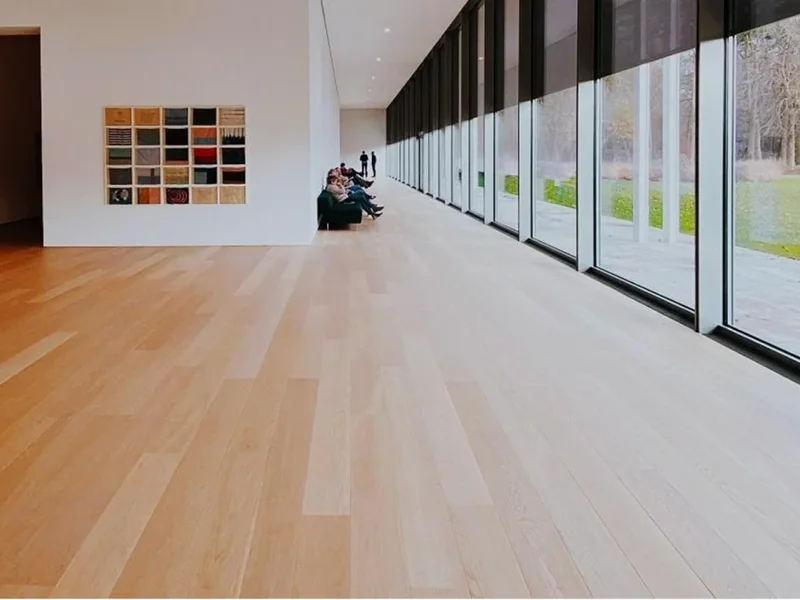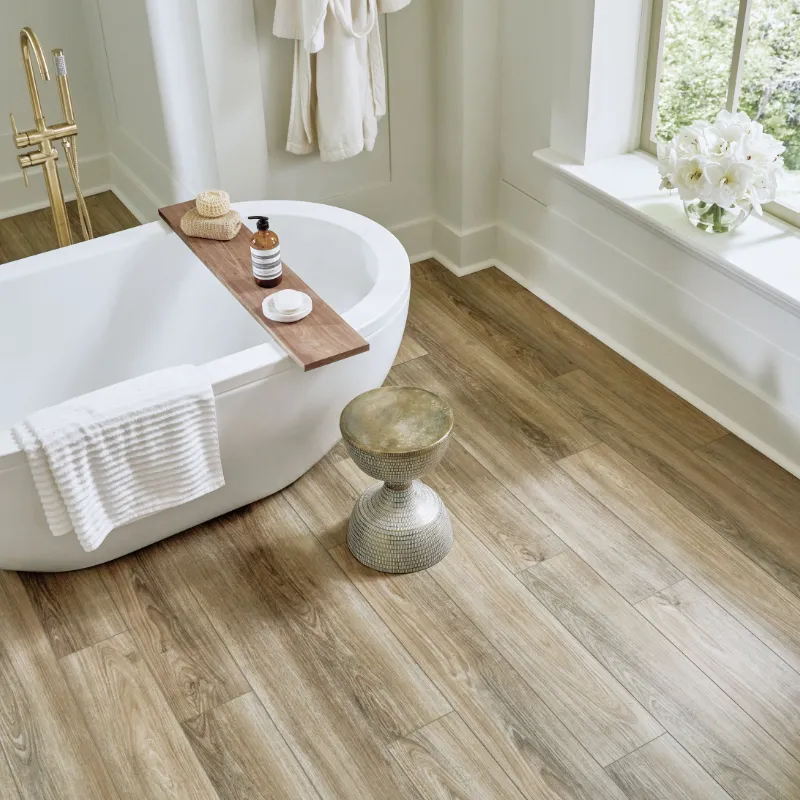Quick Answer: For Texas homeowners, hardwood flooring offers superior long-term value and timeless elegance but comes at a premium price point. Vinyl flooring (LVT/LVP) provides excellent moisture resistance and durability at a more affordable cost, making it ideal for high-traffic areas and moisture-prone spaces. Your best choice depends on room location, budget, and lifestyle needs.
Choosing between hardwood and vinyl flooring is one of the most critical decisions in any home renovation project. With over 35 years of experience serving Texas homeowners since 1989, CC Carpet has helped thousands of families navigate this exact decision. Both flooring types offer distinct advantages, but understanding which works best for your specific situation requires examining durability, cost, maintenance, moisture resistance, and long-term value.
At-a-Glance Comparison: Hardwood vs Vinyl Flooring
| Feature | Hardwood Flooring | Vinyl Flooring (LVT/LVP) |
| Cost | Premium investment | Budget-friendly to moderate |
| Lifespan | 75-100+ years (with refinishing) | 10-25 years |
| Water Resistance | Poor (avoid moisture) | Excellent (100% waterproof) |
| Refinishing | Yes (5-7 times) | No (must replace) |
| ROI/Home Value | High (75-100% return) | Moderate (25-50% return) |
| Installation Time | 3-5 days | 1-3 days |
| Maintenance Level | Moderate to High | Low |
| Best for Texas Climate | Climate-controlled rooms | All rooms including humid areas |
| Pet-Friendly Rating | Moderate | High |
| Scratch Resistance | Low to Moderate | High |
Understanding Hardwood Flooring: Benefits and Performance
Hardwood flooring remains the gold standard for homeowners seeking premium quality and lasting value. Real wood floors deliver natural warmth and character that synthetic materials cannot fully replicate, with each plank displaying unique grain patterns. According to the National Association of Realtors, homes with hardwood floors sell faster and command 2-5% higher prices than comparable homes without them.
Key advantages of hardwood flooring:
- Exceptional longevity: Properly maintained hardwood lasts 75-100+ years, with the ability to refinish 5-7 times throughout its lifespan
- Increases home resale value: Significantly boosts home value depending on square footage and quality
- Timeless aesthetic appeal: Available in dozens of species (oak, maple, walnut, hickory) with endless stain options to match any design style
- Improves indoor air quality: Doesn’t harbor allergens, dust mites, or pet dander like carpet, making it ideal for allergy sufferers
- Sustainable and eco-friendly: Real wood from responsibly managed forests is a renewable resource
For Texas homeowners in climate-controlled environments, hardwood provides an unmatched combination of beauty and long-term investment potential.

Hardwood Flooring Drawbacks: What Texas Homeowners Need to Know
While hardwood offers numerous benefits, it’s not suitable for every situation. The biggest challenge for Texas homeowners is our state’s humidity fluctuations, which can cause wood to expand and contract seasonally. Without proper climate control, hardwood floors may develop gaps in winter or cupping during humid summer months, particularly in areas like Houston or coastal regions.
Cost is another significant factor. Professional hardwood installation represents a substantial investment, with premium species like Brazilian cherry or wide-plank white oak commanding even higher prices. The installation process is labor-intensive, usually taking 3-5 days for an average home, and requires acclimation time for the wood to adjust to your home’s environment.
Hardwood is completely unsuitable for moisture-prone areas including bathrooms, laundry rooms, mudrooms, and basements. Even minor water exposure can cause permanent warping, staining, or cupping. Pet owners should also consider that hardwood is vulnerable to scratches from dog nails, though harder species like hickory offer better resistance. Regular maintenance including sweeping, specialized cleaning products, and periodic refinishing is necessary to preserve the floor’s appearance.
The Rise of Vinyl Flooring: Modern Performance and Versatility
Luxury vinyl tile (LVT) and luxury vinyl plank (LVP) have revolutionized the flooring industry over the past decade. Today’s vinyl flooring bears little resemblance to dated vinyl sheets of the past. Modern vinyl products feature advanced wear layers, realistic embossing, and high-definition printing technology that convincingly replicates hardwood, stone, and tile at a fraction of the cost.
Why vinyl flooring is perfect for Texas homes:
- Superior water resistance: 100% waterproof core makes it ideal for kitchens, bathrooms, basements, and Texas homes in flood-prone areas
- Exceptional durability: Commercial-grade wear layers resist scratches, stains, and dents far better than hardwood, perfect for active families and pets
- Budget-friendly installation: More affordable than hardwood, making it accessible for larger projects or investment properties
- Quick installation process: Click-lock floating systems allow installation in 1-3 days with minimal disruption, often over existing floors
- Low maintenance requirements: Simple sweeping and occasional damp mopping keeps vinyl looking new for years
- Comfortable underfoot: Built-in cushioning provides better sound absorption and comfort compared to hardwood or tile
- Temperature stability: Unaffected by Texas humidity fluctuations, eliminating expansion/contraction concerns
At CC Carpet, we’ve seen vinyl flooring performance improve dramatically. Today’s premium vinyl products from manufacturers like Mohawk deliver outstanding durability that holds up remarkably well in Texas’s challenging climate conditions.

Vinyl Flooring Limitations: Understanding the Trade-offs
Despite its practical advantages, vinyl flooring comes with important limitations. The most significant is resale value. While vinyl won’t decrease your home’s value, it doesn’t add value the way genuine hardwood does. Discerning homebuyers, particularly in higher-end markets, often prefer authentic materials over synthetic alternatives.
Vinyl cannot be refinished or repaired like hardwood. Once the wear layer is damaged or the style becomes outdated, complete replacement is the only option. While quality vinyl typically lasts 15-25 years, this pales in comparison to hardwood’s potential century-long lifespan. Sharp objects, heavy furniture dragged without protection, and extreme heat can damage vinyl permanently.
Environmental considerations matter to eco-conscious homeowners. Vinyl is a petroleum-based product that isn’t biodegradable and has a larger carbon footprint than sustainably harvested hardwood. Lower-quality vinyl products may off-gas volatile organic compounds (VOCs), though premium products now feature low-VOC or phthalate-free formulations. Even high-end vinyl shows repeating patterns and lacks the authentic depth and texture variation found in real wood grain.
Cost Comparison: Long-Term Value Perspective
Understanding the total cost of ownership over time provides crucial perspective. Hardwood represents a premium upfront investment that pays dividends over time. The material and professional installation require substantial initial capital, but the floor can be refinished multiple times throughout its lifespan rather than replaced. When factoring in the significant value added to your home and potential century-long lifespan, hardwood often proves cost-effective for homeowners planning to stay long-term.
Vinyl offers a more accessible entry point with lower upfront costs, making it attractive for budget-conscious renovations, rental properties, or homes requiring flooring for multiple rooms simultaneously. However, vinyl cannot be refinished and will eventually require complete replacement. The moderate contribution to home value means vinyl is best viewed as a practical solution rather than a long-term investment vehicle.
Which Flooring is Best for Different Rooms?
Based on our 35+ years of experience at CC Carpet helping Texas homeowners, here are our professional recommendations:
Best rooms for hardwood flooring: Living rooms and great rooms, dining rooms, bedrooms and home offices, hallways in climate-controlled areas, and first-floor living spaces with proper moisture barriers.
Best rooms for vinyl flooring: Kitchens, bathrooms and powder rooms, laundry rooms and mudrooms, basements and below-grade spaces, high-traffic entryways, homes with large dogs or multiple pets, and rental properties requiring durability.
Many homeowners choose a hybrid approach, installing hardwood in main living areas while using vinyl in practical spaces like kitchens and bathrooms. This maximizes both value and functionality while staying within budget.
Texas-Specific Climate Considerations
Texas’s diverse climate zones present unique flooring challenges. Coastal areas like Corpus Christi and Galveston experience high humidity that can stress hardwood floors without proper HVAC control. Central Texas regions including Austin and San Antonio face dramatic seasonal humidity swings. North Texas (DFW) sees temperature extremes from freezing winters to scorching summers.
For hardwood success in Texas, maintain indoor humidity between 35-55% year-round using humidifiers in winter and dehumidifiers or air conditioning in summer. Engineered hardwood offers better dimensional stability than solid hardwood for Texas homes, with cross-layered construction that resists expansion and contraction.
Vinyl flooring excels in Texas’s variable climate, remaining completely stable regardless of humidity or temperature fluctuations. This makes it particularly valuable for older homes without modern climate control, new construction during the settling period, or investment properties where climate control isn’t consistently maintained.
Make Your Flooring Decision with Confidence at CC Carpet
Choosing between hardwood and vinyl flooring doesn’t have to be stressful. The right answer depends on your specific situation: room location, budget constraints, lifestyle needs, long-term plans, and personal preferences. Hardwood delivers unmatched elegance, longevity, and resale value for those who can invest in quality and maintain proper climate control. Vinyl offers practical durability, moisture resistance, and affordability that makes beautiful flooring accessible for any room in your home.
Since 1989, CC Carpet has been Texas’s trusted flooring partner, helping homeowners make smart decisions backed by honest guidance and transparent pricing. Our experienced team understands the unique challenges of Texas’s climate and can recommend solutions tailored to your home’s specific needs. As a Mohawk Five-Star retailer, we offer premium hardwood and luxury vinyl options that deliver lasting performance and beauty.
Ready to transform your home with the perfect flooring? Visit one of our convenient Texas showroom locations in Bedford, Mesquite, or Richardson to see hundreds of flooring options in person and feel the quality difference. Contact CC Carpet today to schedule your complimentary in-home estimate and discover why thousands of Texas families trust us for their flooring needs. Let our 35+ years of expertise guide you to floors you’ll love for decades to come.
Can hardwood floors be installed in Texas kitchens? While possible, hardwood in kitchens is risky due to water exposure from sinks, dishwashers, and spills. Many homeowners prefer vinyl or tile in kitchens. If choosing hardwood for kitchens, select harder species and maintain vigilance about moisture.Which flooring option is more eco-friendly? Hardwood from sustainably managed forests is more environmentally friendly as a renewable, biodegradable natural material. Vinyl is petroleum-based and not biodegradable, though some manufacturers now offer recycled content and recycling programs.
Frequently Asked Questions
Which flooring is better for resale value: hardwood or vinyl? Hardwood flooring significantly increases home resale value, with the National Association of Realtors reporting that 54% of buyers are willing to pay more for homes with hardwood floors. Quality hardwood can return 75-100% of installation costs at resale, while vinyl typically returns 25-50%.
How long does each type of flooring last? Hardwood floors can last 75-100+ years with proper maintenance and periodic refinishing. Quality vinyl flooring typically lasts 15-25 years before requiring replacement, depending on wear layer thickness and foot traffic.
Which is easier to maintain in Texas homes? Vinyl flooring requires significantly less maintenance, needing only regular sweeping and occasional damp mopping. Hardwood requires more careful cleaning with specialized products, protection from moisture, and periodic refinishing.
Is vinyl flooring safe for families with children and pets? Modern vinyl flooring is very safe for families. Quality products are low-VOC or VOC-free, and the durable wear layer resists scratches from pets far better than hardwood. Vinyl’s softer surface is also more forgiving for young children.
Can hardwood floors be installed in Texas kitchens? While possible, hardwood in kitchens is risky due to water exposure from sinks, dishwashers, and spills. Many homeowners prefer vinyl or tile in kitchens. If choosing hardwood for kitchens, select harder species and maintain vigilance about moisture.
Which flooring option is more eco-friendly? Hardwood from sustainably managed forests is more environmentally friendly as a renewable, biodegradable natural material. Vinyl is petroleum-based and not biodegradable, though some manufacturers now offer recycled content and recycling programs.


